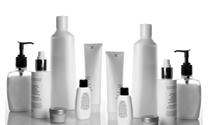
07 Jul Personal Care Products
DID YOU KNOW
If you are serious about your health, the first thing you would eliminate in your home is perfume, air fresheners and all products that contain artificial fragrances (parfum). Many are phthalates which are known to affect fertility and increase the risk of breast cancer.
By the time you left your home this morning, the average woman would have exposed herself to over 200 chemicals and a man to around 100. Surprisingly, only 80% of the ingredients in your personal care products have been assessed for their impact on human health. Unfortunately the cosmetic industry is largely self regulated which means little or no regulation. Did you know for example, that when you see the word Organic on a label, it refers to the scientific definition that it contains the atom carbon. It has nothing to do with being pesticide free or still in its natural state. The great majority are derived from petrochemicals, and several are known carcinogens however “they are are present in acceptable limits”.
Who Regulates Cosmetics in Australia
Cosmetics are regulated by the National Industrial Chemicals Notification and Assessment Scheme (NICNAS). The labelling of ingredients is overseen by the Australian Competition & Consumer Commission. Whilst NICNAS dont test ingredients for adverse health effects, they rely on international authorities such as Cosmetic Ingredient Review , US Food and Drug Administration and Health Canada for their analysis. This reactive approach is not protecting consumers, as they wait until the disease occurs in the population before they act.
10 Ingredients to Avoid
- Fragrances and perfumes
Most fragrances contain hundreds of ingredients that the manufacturer is not required to disclose due to ‘trade secrets’. Fortunately there is a push to make the thousands of primarily petrochemical ingredients used in perfumes to be more transparent. Here is a list of just some of them. The concern is that fragrances may contain phthalates which mimic the hormone oestrogen and consequently should be avoided in women because of its link to breast cancer. Pregnant women SHOULD avoid perfume and all personal care products with artificial fragrances as they may harm the reproductive health of their unborn child. Many of the phthalates that have been banned by the European Union still continue to be present in products sold in Australia, the United States and the United Kingdom. - Preservatives such as triclosan
A full list of preservatives that should be avoided in your products is listed in the book Healthy Home, Healthy Family. - Talcum powder
Not only is talcum powder a lung, eye and skin irritant, a recent Harvard Medical School study has confirmed what has long been suspected; that it may also increase the risk of ovarian cancer when applied as a powder to the genitals of baby girls (Gates et al, 2008). - Aluminium antiperspirants
There are suspicions that antiperspirants may be associated with Alzheimer’s disease because autopsies of the brain of deceased victims show higher levels of aluminium (Perl and Brody, 1980). In addition there are also concerns that it may increase the risk of breast cancer because aluminium interferes with the function of oestrogen receptors (Darbre, 2005). Whilst the preliminary evidence is not conclusive, it should be avoided until it can be proven to be safe. - Bubble bath and some types of detergents.
Detergents are the foaming agents in your shampoo, bubble bath, body wash and liquid soap. Many detergents including the coco betaines and lauryl/laureth sulphates are a common cause of skin problems and dandruff. Detergents and fragrances in bubble bath may irritate the urethra (where the urine comes out) and therefore make your child more susceptible to urinary tract infections. - Head lice treatment
Head lice treatment that contains the pesticide lindane should be avoided as it is toxic. - Lipstick
A survey conducted by the US Food & Drug Administration found all 400 lipsticks contained lead including those marketed as natural (US FDA, 2010). It appears that lead is not added to lipsticks, rather it is found naturally in the tints mined from the ground. L’Oreal and its subsidiary Maybelline contained five of the top ten lipsticks for lead content. Read more… - Sunscreens
Sunscreens play an important role in protecting you from the harmful effects of UV radiation. Disturbingly however, an investigation of 882 sunscreens concluded that 4 out of 5 products offer inadequate protection from the sun, or contain ingredients with significant safety concerns (Environmental Working Group, 2009). Read more… - Children under 4 years of age should avoid fluoridated toothpaste.
Topical application of fluoride in the form of toothpaste has a protective effect on preventing tooth decay. However children should not use fluoridated toothpaste until they are old enough to spit it out (from the age of 4 or so). The health concerns associated with fluoride include mottling of the teeth, osteosarcoma (bone cancer) and osteoarthritis (it displaces fluoride and makes bones brittle). Until then, a non-fluoridated toothpaste from your local health food store or food co-operative is a safer option for young children. - Incidental ingredients such as phthalates, dioxins, nitrosamines and formaldehyde. Unfortunately they are not required to be disclosed on the label. However they are commonly found associated with specific ingredients which are outlined in the book Healthy Home Healthy Family.
Products
Here is a list of some brands being mindful that not all of the products in their range may comply with the information I have provided. As always, READ THE LABEL!
- Aromababy, Aubrey Organics, Avalon Organics, Badger, Burt’s Bees, Cosmic Tree, Dr Bronners (soap), Dr Hauschka, Earth Tribe, Food For Your Skin, Living Nature, Miessence, Organic Rosehip Skincare, Phyts, Tom’s of Maine and Weleda.
